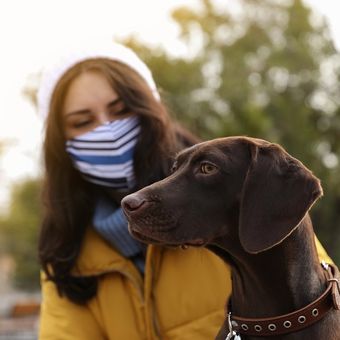JAKARTA, KOMPAS.com – When people have the flu, they generally keep their distance from other people to prevent transmission of the virus.
Various attempts have been made, from wearing masks to silence in the bedroom. In fact, some people limit chatting with family members when they’re at home.
Read also: 6 facts about the rabies virus that attacks cats and dogs
Of course, nobody wants another family member to catch the flu. However, there are different owners dog which does the same thing with fur friends.
They limit contact with domestic dog not to spread the flu. However, can dogs get the human flu?
Viruses that cause colds in dogs and humans
Reported by Health line reviewed by a veterinarian, Vincent J. Travella, Thursday (11/17/2022), influenza is a respiratory illness caused by a virus. There are many types of viruses that cause flu.
“In fact, there are two specific types of viruses that can cause the flu or canine flu in dogs. These viruses are different from those that cause the common cold in humans,” the article states.
In dogs, the virus that causes canine flu or canine flu can cause symptoms such as a cough, runny nose, and lethargy.
Read also: 5 Interesting Facts About Dog Whiskers, it has a way of functioning like an antenna
According to the Centers for Disease Control and Prevention (CDC), there have been no reported human cases of canine flu. However, what about the transmission of flu from humans to dogs?
A study titled “Evidence for Subclinical Influenza A(H1N1)pdm09 Virus Infection Among Dogs in Guangdong Province, China” in 2014 and titled “Canine Susceptibility to Human Influenza Viruses (A/pdm 09H1N1, A/H3N2 and B)” in 2015 found showed that human influenza viruses can infect dogs, particularly the 2009 H1N1 and H3N2 strains.
However, while it’s clear that dogs can be infected with some human flu viruses, they don’t appear to actually be sick.
Read also: Functions and dangers of removing dog whiskers
What about bacterial infections?
There are several bacterial infections that dogs can potentially contract from humans, including salmonellosis, campylobacteriosis, and methicillin-resistant Staphylococcus aureus (MRSA).
For Salmonellosis or Salmonella bacteria can cause disease in dogs and humans. The infection can cause symptoms such as fever, diarrhea and vomiting.
Bacterial transmission is fecal-oral. This means that you could potentially pass it on to your pet if he suffers from not washing his hands properly after using the toilet.
In this case touching the dog’s mouth or face can transmit salmonellosis to fur mates.
Read also: Do dogs have the same emotions as humans?
Campylobacteriosis jejuni bacteria cause infections in dogs and humans. Symptoms in dogs can include watery diarrhea, decreased appetite and fever. Transmission is the same as Salmonella.
 Illustration of a dog, Illustration of a person wearing a mask, Illustration of a mask.
Illustration of a dog, Illustration of a person wearing a mask, Illustration of a mask.Humans can carry MRSA on the skin without any symptoms. However, a potentially serious skin infection can occur if the bacteria enters through a break in the skin.
Dog potentially exposed to MRSA from humans who carry the bacteria on their skin. In dogs, MRSA can cause skin, respiratory and urinary tract infections.
Can dogs transmit diseases to humans?
Dogs can transmit various diseases to humans, from bacterial diseases, viral diseases, fungal diseases to parasitic diseases.
For bacterial diseases, one of them is campylobacteriosis which can cause digestive symptoms such as diarrhoea, fever and cramps. The bacteria can be spread through contact with the feces of infected dogs.
There is also MRSA which is transmitted through direct contact with dogs carrying the bacteria. They can cause skin infections if the bacteria get into a wound on human skin.
Read also: Things to do when pet dogs get diarrhea
Viral diseases such as anger it can be spread through bites or scratches from infected dogs. The disease can cause a variety of severe neurological symptoms.
 Illustration of a dog and its owner.
Illustration of a dog and its owner.Fungal diseases such as ringworm can be transmitted from dogs to humans through contact with infected dogs. In humans, this disease often causes a ring-shaped rash that is itchy and scaly.
Read also: 6 most famous types of Spitz dogs in the world, what are they?
There are several parasitic diseases that can be transmitted from dogs to humans. Most of them are present in the feces of infected dogs.
One of the infectious parasitic diseases is cryptosporidiosis. They can be spread by ingesting the feces of infected dogs. Symptoms include watery diarrhea, cramping, and nausea or vomiting.
Read also: Do dogs like to vomit on the carpet? Here’s the reason
If you don’t want to spread and get sick, always pick up dog waste as soon as possible and throw it in a sealed bag.
Next, wash your hands with soap after handling your dog or its litter box, food and drink bowls, and toys.
Limit contact with pet dogs if they have a disease that can be passed on to them. So, don’t forget to visit the vet for regular checkups and vaccinations.
Get updates Featured News And latest news every day from Kompas.com. Let’s join the Telegram group “Kompas.com News Update”, like click on the link https://t.me/kompascomupdate, then join. You must first install the Telegram application on your mobile phone.
/data/photo/2022/11/17/63762c0c8d6e6.jpg)

